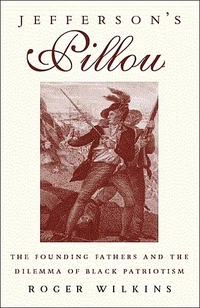

Purchase
The Founding Fathers and the DIlemma of Black Patriotism
Beacon Press
July 2002
On Sale: July 12, 2002
163 pages
ISBN: 0807009571
EAN: 9780807009574
Paperback
Add to Wish List
Non-Fiction History
An outspoken participant in the civil rights movement,
Roger Wilkins served as Assistant Attorney General during
the Johnson administration. In 1972 he was awarded the
Pulitzer Prize along with Bernstein and Herblock for his
coverage of Watergate. Yet this black man, who has served
the United States so well, feels at times an unwelcome
guest here. In Jefferson's Pillow, Wilkins returns to America's
beginnings and the founding fathers who preached and fought
for freedom, even though they owned other human beings and
legally denied them their humanity. He asserts that the
mythic accounts of the American Revolution have ignored
slavery and oversimplified history until the heroes, be
they the founders or the slaves in their service, are
denied any human complexity. Wilkins offers a thoughtful analysis of this fundamental
paradox through his exploration of the lives of George
Washington, George Mason, James Madison, and of course
Thomas Jefferson. He discusses how class, education, and
personality allowed for the institution of slavery,
unravels how we as Americans tell different sides of that
story, and explores the confounding ability of that
narrative to limit who we are and who we can become. An important intellectual history of America's founding,
Jefferson's Pillow will change the way we view our nation
and ourselves. "We are obliged to judge because we are obliged to do
better; to probe the flaws of our predecessors is to engage
not in vindictive finger-pointing but to resist hubris and
complacency in our own time. Wilkins' book has made a
mirror of the past in which we glimpse our own
shortcomings —and perhaps even the means for transcending
them." —Philip Connors, In These Times (full review online) "Wilkins makes a case for his opinions in sentences that
enchant and inform. In its persuasive blend of logic and
lyricism, Wilkins's language at its most potent is
positively . . . Jeffersonian." —Jabari Asim, Washington
Post Book World (full review online) With a sense of genuine curiosity Wilkins tried to avoid
either condemning the founders too easily by modern
standards or excusing too easily the contradictions of
their slave ownership. Instead, by exploring the culture
and atmosphere in which they grew up, he discovered how
much slavery was an integral part of the Virginia society
that enabled the founders to create the recipe for modern
rights, equality and democracy. —Clarence Page, Chicago
Tribune (full article online) "Wilkins, who describes himself as a 'deeply committed
American,' is never less than a patriot here; someone
indifferent about America could not write such a thoughtful
book. He demythologizes the Founding Fathers, yet expands
their greatness by placing it within the context of the
times, as well as their flawed humanity." —Boston Globe "When the Founding Fathers were deciding whether to risk
their lives and fortunes for their ideals, Benjamin
Franklin remarked: 'We must all indeed all hang together,
or most assuredly we shall hang separately.' In the years
after their bold gamble for freedom, the hangman's noose
played a far darker role in our republic, becoming the
lynch mob's weapon of choice for denying African-Americans
their inalienable rights. Liberty and freedom, repression
and racism, these warring yet braided strands form the
Gordian knot of the American experience: A land of
visionary light entwined in the darkest recesses of human
cruelty. Now comes Roger Wilkins like a modern-day
Alexander to cut this knot." —J. Peder Zane, Raleigh News
and Observer "This astonishing book by the 1980s antiapartheid leader
Wilkins (a professor of history at George Mason University
and Pulitzer-Prize winner) provides a brief, but
tremendously incisive demythologizing of four Virginian
founders—Washington, Jefferson, Madison, and Mason (whose
stature Wilkins justly elevates)—and their conflicted
attitudes toward race, in the process of humanizing them
and deepening our appreciation of the internal struggles
involved in achieving their greatness, however flawed or
incomplete. (There's nothing forced in this evaluation, as
Wilkins acknowledges their enormous contribution to
activists such as himself today.) Where others routinely
excuse past figures or judge them by present standards,
Wilkins exemplifies a subtler, sounder approach. Reaching
back to England and Virginia in the 1600s, he briskly
illuminates the historical, ideological, and socioeconomic
contexts that made a burning concern for freedom not just
compatible with slavery, but materially and psychologically
dependent on it....His insight recalls James Baldwin,
arguably the best we've ever had for appreciating the
humanity of even the most flawed among us without yielding
an inch of moral principle." —Publishers Weekly
Comments
No comments posted.
Registered users may leave comments.
Log in or register now!
| 


 © 2003-2024 off-the-edge.net
all rights reserved Privacy Policy
© 2003-2024 off-the-edge.net
all rights reserved Privacy Policy